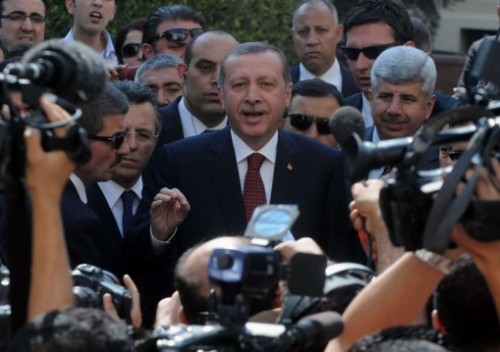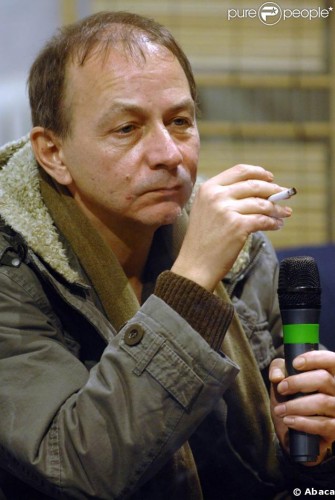Bretaña, megalitos y celtas
Enrique Ravello
Ex: http://www.idpress.org/
Para quien lo ve desde lejos, el Mont Sant-Michel, aparece distante, inaccesible, como el reflejo de otra realidad superior, que desde aquí se puede tan sólo intuir. Las mareas hacen que a veces permanezca aislado, para posteriormente, cuando el mar se retira, volver a ofrecernos la posibilidad de penetrar en él, quizás como reflejo analógico de esa realidad superior que todos intuimos, pero que nuestras propias construcciones mentales, nuestras debilidades, nuestras pasiones –el mar- nos impidan identificarnos con ella. El hecho que desde épocas druídicas, éste haya sido un lugar de culto religioso, cuyas sucesivas construcciones han culminado en el impactante aspecto actual, refuerzan el significado especial del lugar, siendo sin duda un importante punto mágico.
Pero además de todo esto, el Mont Sant-Michel marca la frontera histórica entre los ducados de Bretaña y de Normandía, aunque siempre se ha considerado más normando que bretón, y hoy ha quedado administrativamente incluido en Normandía, los bretones incluso han versificado esta reivindicación:
«Le Couesnon a fait foile,.
Cy est le Mont en Normandie».
Entrar a Bretaña desde Normandía, supone en cambio mucho mayor de lo que la corta distancia que las separa podría hacer pensar, se deja atrás una región donde las huellas escandinavas son muy visibles, desde las construcciones hasta la antropología física de sus habitantes, para adentrarse en el no menos fascinante mundo celta de Bretaña, en la que más allá de cualquier intento de asimilación por parte del jacobinismo parisiense, la conciencia de su realidad étnica está muy presente.
La Bretaña se divide en dos zonas: la Armórica, conocida por los galos como Armor, que etimológicamente significa «región cercana al mar», y la zona interior, Argoat, o región interior. Otra división más típica, es la de Baja y Alta Bretaña, siendo la primera donde se conservan más arraigadas las costumbres bretonas, y, especialmente, el idioma.
BRETAÑA A TRAVÉS DEL TIEMPO.
La primera realidad con la que nos encontramos en Bretaña es el Megalitismo, una de las más tempranas expresiones culturales europeas, cuya explicación aún es un misterio para muchos autores, pero que como ha demostrado Colin Renfrew y el C 14, nace en el Atlántico norte para desde ahí descender hacia el sur y penetrar en el Mediterráneo.
Antes de la llegada de los bretones, esta península recibía el nombre de Armórica, y estaba habitada por pueblos celtas, que formaban parte del conjunto galo y que habían llegado a esta zona entorno al 500 aC. Estos galos serían, para entendernos, Asterix y sus amigos, que no son los ascendientes de los actuales bretones. A pesar de los que nos cuentan estos divertidos comics, la romanización llegó con fuerza hasta Armórica, hay vestigios suficientes que así lo atestiguan. La romanización supuso el abandono lento pero progresivo del galo, pues los habitantes comenzaron a acostumbrase a usar el latín como lengua oficial pero también cotidiana, de este latín vulgar es del que nacerá el actual francés. El hecho de que en Bretaña se hable hoy una lengua celta se debe a la «receltización» de la Armórica (después Bretaña) entre los siglos V y VI por los bretones venidos desde Gran Bretaña.
Ya hemos dicho que la instalación de los anglos y sajones en Gran Bretaña llevó a que los bretones, desposeídos de sus tierras, se refugiasen en Armónica, hecho que sirve como marco histórico a las leyendas artúricas. No sabemos mucho de la acogida que recibieron estas bandas de inmigrantes entre los años 400 y 600, seguramente se fueron instalando en gran número en las zonas despobladas del país, pero donde la población primitiva era suficientemente densa se produjeron enfrentamiento, como el que tuvo lugar en el siglo VI en la zona de los vénetos (tribu gala) donde el jefe bretón Waroch tuvo que imponerse a la fuerza, los armoricanos de Vannes pidieron ayuda a los francos para hacer frente a esta invasión bretona, pero no lograron pararla y Waroch extendió sus dominios hasta lo que hoy conocemos como Bretaña, esta expansión sólo fue frenada por Carlomagno, quien para ello instituyó la llamada Marca Bretona.
Los herederos de Carlomagno dejaron el dominio de la zona a un jefe bretón, Nominoé, quien termina por independizarse totalmente, instaurar la monarquía bretona y extender sus domino hasta Rennes y Nantes, antes de morir en 851. Su nieto Salaun extiende las fronteras de Bretaña hasta la máxima extensión que nunca han conocido y se afirma en el título de «Rey de los bretones». Pocos años después comienzan las incursiones vikingas, que son derrotados en una primera instancia por Alain el Grande, quizás el soberano más importante de la historia bretona, aunque a principios de siglo X vuelven a conocerse importantes incursiones vikingas hasta que son derrotados de nuevo por Alain Barbe-Torte, último rey de Bretaña muerto en 952, sucediéndole un periodo de anarquía interna y miseria que durará hasta el siglo XIV.
De 1341 a 1364 se desarrolla una guerra, que sumirá a Bretaña en la ruina, por la sucesión del ducado en la que Carlos de Blois, apoyado por los franceses es derrotado por Juan de Montfort, aliado de los ingleses. La casa de Montfort pasa a dominar Bretaña desde 1364 a 1468 vuelven a levantar el país, siendo éste el período más floreciente de su historia, los duques son auténticos soberanos, y sólo rinden un homenaje teórico a los reyes de Francia.
Ya en 1491, Ana de Bretaña se casa con Carlos VIII, rey de Francia, permaneciendo como duquesa de Francia. Carlos VIII muere accidentalmente, ella se convierte en reina de Francia, y se vuelve a casar con Luis XII. A su muerte, su hija Claudia de Francia, heredera del ducado, Claudia se casa con Francisco I quien hace la definitiva unión entre Francia y Bretaña.
Un hecho del que aún hoy están muy orgullosos los bretones, es que en 1534 Jacques Cartier descubra las costas de Canadá, dando inicio a una constante corriente de emigración de bretones hacia el nuevo territorio, siendo éste, junto a la emigración normanda, el origen de la actual población francófona de Québec.
Durante los siglos XVI, XVII y XVIII asistimos a algunos conatos de guerra de religión, revueltas populares y actividades corsarias, centradas estas últimas en la ciudad de Sant Malo.
La Revolución de 1789 es acogida de diferente forma por los bretones; mientras unos la apoyan con entusiasmo, otros organizan una gran revuelta lealista conocida como La Chouannerie. Pero es con el triunfo definitivo de la Revolución cuando se inicia el proceso de uniformización al que tanto se han opuesto el conjunto de los bretones.
EN LUCHA POR LA IDENTIDAD.
El movimiento bretón fue el más precoz en su aparición dentro de la escena política francesa, pues lo hizo antes de 1914. En la Francia revolucionaria y más tarde en la república burguesa del XIX, Bretaña se convirtió en uno de los bastiones de la resistencia contrarrevolucionaria de la nobleza apoyada por el clero, potando por una economía agraria lo más autárquica posible.
Durante la primera mitad del siglo XIX tuvo lugar un despertar cultural en el que se exaltó el pasado celta y las tradiciones culturales propias. La defensa de la fe católica y del idioma bretón se concebía también como una barrera infranqueable para el laicismo y el republicanismo. Ya en tiempos de la III República la aristocracia agraria bretona recurrió a la movilización del campesinado como estrategia de oposición al estado central, y fue en 1898 cuando se constituyó la Unión Regionalista Bretona (URB), de la que en 1911 se escindieron dos grupos: la Federación Regionalista Bretona y el Partido Nacional Bretón, que fue el primero en definir a Bretaña como una nación «oprimida como Polonia e Irlanda».
La Primera Guerra Mundial supuso una decadencia imparable de la preeminencia económica de la elite aristocrática agraria, acentuándose la emigración bretona hacia otras partes de Francia, especialmente París. Una nueva generación de estudiantes de Rennes y Alta Bretaña tomó el relevo en la dirección del movimiento bretón. En 1918 tres jóvenes monárquicos influidos por las teorías de Maurras y el vanguardismo cultural fundaron el Grupo Regionalista Bretón (GRB) y empezaron a editar una revista bilingüe en francés y bretón, Breiz Atao, referente histórico del nacionalismo bretón. En 1920 Olier Mordrel y otros dos activistas del GRB fundaron la Unión de la Juventud Bretona (Unvaniez Yaonakiz Vreiz), mostrando una mayor tendencia a la radicalización, siendo partidarios del vanguardismo cultural y del laicismo, y a partir de finales de la década de los veinte, experimentaron una paralela orientación hacia la derecha radical. El zeitgeist de la liberación de los pueblos, así como el influjo de los nacionalistas irlandeses y, en menor medida, galeses, considerados como hermanos por los jóvenes bretonnats, tuvo una gran influencia en este grupo. De hecho la componente celtista de Breiz Atao buscaba redefinir el lugar de Bretaña dentro de la comunidad supranacional de «naciones celtas», estrechando relaciones con los nacionalistas galeses desde 1922. Como objetivo inmediato el PNB proponía la transformación de Francia en un Estado federal y su incardinación en un proceso de unidad a escala europea.
Pero el fracaso electoral actuó de detonante en las divisiones internas del movimiento, dentro del que emergerían con claridad una tendencia de derecha radical e independentista, encabezada por Mordrel, y otra de izquierda liberal y federalista, encabezada por Duhamel y Marchal. El sector de Mordrel, el más importante, refundó el PNB en 1931 con claros contenidos fascista y corporativos combinados con la idealización de los métodos de la acción directa y el insurreccionalismo de inspiración en el Sinn Féin irlandés, si bien sólo se registraron acciones armadas esporádicas e incruentas por parte del grupo Gwenn ha Du (Blanco y Negro, en referencia a la bandera bretona). En el programa Por un partido bretón de los celtas redivivos publicado por Olier Mordrel en 1933, el PNB declara su aspiración a un Estado bretón que excluyese de los puestos públicos a extranjeros y razas latinas, respetase la pequeña y mediana propiedad pero socilaizase la gran propiedad y se fundase en una vía intermedia entre el capitalismo y el socialismo, basada en una comunidad nacional sin clases.
Dentro del PNB, el propio Mordrel encabezaba una tendencia más radical que editaba la revista Stur, donde los contenidos nacionalsocialistas se hicieron explícitos, combinándose con un racismo pancétlico y antisemita, en la que proponían una futura Europa dirigida por los pueblos célticos y germánicos. El
PNB logró controlar al grupo Gwenn ha Du e integrar el terrorismo en su estrategia política, al tiempo que creaba una pequeña milicia paramilitar. Ya existían algunos contactos con Alemania a través del Instituto Anhenerbe de la SS y de los círculos celtólogos de Munich, así como por vía indirecta de algunos autonomistas alsacianos, hacia 1939-1939 estas relaciones se intensificaron, Breiz Atao apoyará el expansionismo alemán y promoverá una campaña contra la entrada de Francia en la guerra contra Alemania.
El PNB rehusó a presentarse a las convocatorias electorales, prefiriendo actuar como un grupo de presión que apoyaba a los candidatos de partidos franceses en la medida en que juzgaban que apoyaban un programa de mínimos. En el congreso de Guingamp la tendencia nacionalsocialista e insurreccionista, dirigida a la extinción del Estado francés, se impuso claramente, se organizó una milicia dirigida por Célestine Lainé que recibió armas de Alemania a través del IRA. Como resultado de sus actividades el gobierno francés prohibió las actividades del partido y varios de sus líderes, entre ellos Mordrel, tuvieron que huir a Alemania, donde se relacionaron con ambientes nacionalistas radicales flamencos e irlandeses y con diversas instituciones alemanas.
La invasión de Francia por Alemania en 1940 fue vista por el nacionalismo bretón como la gran oportunidad para construir su Estado independiente, algo que contó con el apoyo total del régimen alemán, y especialmente de la SS. Incluso se propició una reunión entre los representantes bretones y Doriot, el líder fascista francés, en la que éste admitió la existencia de una nación bretona diferente a la francesa, y se estableció que en caso de una victoria final del Eje, Bretaña se independizaría de Francia. Mordrel volvió a Bretaña y siguió al frente del PNB, uniendo la causa bretona a la suerte de Alemania en la guerra, también se fundaron organizaciones como los Bagadoú Stourm (Grupos de combate), una organización paramilitar, cuya bandera está inspirada en los símbolos bretones y en la bandera alemana de guerra (como aparece en la ilustración del texto). E incluso hubo nacionalistas bretones más radicales que rechazaron la no entrada en acciones bélicas del PNB y crearon una unidad bretona dentro de las SS, compuesta por varias decenas de hombres, y conocida como el Bretonische Waffenverband der SS, que usó como bandera, la más antigua de Bretaña, una cruz negra sobre fondo blanca.
Tras la Segunda Guerra Mundial el estigma del colaboracionismo afectó a todos los intentos de refundar el movimiento bretón. Los esfuerzos de los militantes bretonistas, así como de las nuevas generaciones, tuvieron que concentrarse en las actividades culturales, para pasar en una segunda fase a la formulación de reivindicaciones socioeconómicas y, finalmente, articular un nuevo discurso político nacionalista de componentes diferentes, donde se haría fuerte el elemento democrático y, a veces, izquierdista, influido por el momento y los diversos movimientos de liberación nacional. Si bien también es cierto que muchos de los antiguos militantes bretones de inspiración nacionalsocialista, pasaron a formar parte de estos grupos izquierdistas, y que seguían siendo muy permeables a las influencias que sus antiguos camaradas fieles a las ideas anteriores ejercían desde diversas publicaciones, como fue el caso de Mordrel, quien siguió cantando las excelencias de la Europa de las etnias propugnada por el III Reich hasta su muerte, y de la revista La Bretagne Reéle. Destacable es también el hecho de que algunos nacionalistas bretones de este grupo pasarán a formar parte de las candidaturas del FN de Le Pen en las elecciones locales.
Como acabamos de decir después del 45 asistimos en un primer momento a la refundación de grupos culturales. En 1946 fue lanzada la Asociación de Gaiteros fundada inicialmente en 1943. A ella siguen círculos célticos locales y varias revistas y grupos de defensa del idioma bretón que organizaron marchas cívicas en defensa de la lengua en los primeros años sesenta.
Las demandas socioeconómicas empezaron a formularse a partir de la constitución en 1951 del Comité de Estudios y Vinculación de los Intereses Bretones que aspiraba a convertirse en el portavoz de todos los intereses corporativos, sociales y económicos de Bretaña y sus «fuerzas vivas».
Fue en 1956 cuando se comenzó a rearticular políticamente el movimiento bretón. En 1956 varios activistas fundaron el Projet d´Organisations de la Bretagne con objetivos regionalistas que al año siguiente se convirtió en el Movimiento por la Organización de Bretaña (MOB). Los sectores juveniles y estudiantiles, centrados en Rennes, contemplaban con simpatía el proceso de independencia de Argelia, mientras el ala conservadora proclamaba la solidaridad de los bretones con los colonos franceses, esta misma facción más juvenil se orientaba hacia la izquierda, posteriormente abandonó la organización y fundó la Unión Democrática Bretona (UDB), la principal fuerza nacionalista de postguerra. Después han surgido grupos más o menos radicales y particularmente organizaciones partidarias de la violencia como el Frente de Liberación de Bretaña (FLB) fundado en 1966 y autor de numerosos atentados incruentos, siendo desmantelado numerosas veces y reorganizado de nuevo. En 1982 surgieron el Partido Republicano Bretón (Strollad Pobl Breizh) y el Partido por la Organización de una Bretaña Libre (POBL) de carácter centrista y europeísta, con débil implantación electoral, con alguna fuerza política en las zonas rurales de Finisterre, y que en los últimos tiempos ha protagonizado varias campañas de apoyo al independentismo vasco.
Si bien durante los 70 y 80 hubo alguna tímida colaboración con la izquierda francesa, en especial con el PSF de Mitterrand, ésta se terminó en 1982 con la victoria electoral del socialismo francés, al esperar que cumpliesen su promesa de regionalización, y por el contrario, encontrarse con la desagradable sorpresa de que la trazar la región bretona dejaron a Nantes –la capital histórica- fuera e incluida en un fantasmagórico País del Loira.
EL BRETÓN, VESTIGIO CELTA.
Como las lenguas romances, germánicas y otras, las celtas forman parte de la gran familia indoeuropea. En el siglo III aC ocupaban dos tercios del continente europeo, y se hablaban desde el mar Negro hasta el Atlántico. Sólo cuatro de estas lenguas han sobrevivido hasta hoy, en el extremo occidental de Europa. Se clasifican en dos sub-grupos:
-El galés y el bretón, forman parte del grupo britónico, al que pertenecía también el córnico.
-El gaélico de Irlanda y el de Escocia, pertenecen al grupo goidélico, como el manx .
Cada una de estas lenguas han tenido una evolución propia, y su situación varía de un país a otro:
-En Irlanda, el gaélico es la primera lengua oficial del la República de Irlanda, el inglés teóricamente, es sólo la segunda, 1.000.000 de personas declaran hablarla actualmente, es decir un tercio de la población. Pero en el Gaeltacht –las zonas de práctica tradicional de la lengua- los que la hablan cotidianamente no son más que unos miles.
-En Escocia, menos de 70.000 personas (1,4% de la población) hablan hoy en gaélico, principalmente en las islas Hébridas y al noroeste de las Highlands.
-El galés, beneficiado por una política dinámica, es la lengua celta con la situación más favorable. El número total de hablantes había disminuido a la mitad en 1911; se estableció en 508.000 personas y hoy está creciendo.
-Otras dos lenguas celtas han desaparecido. En la isla de Man, el último habitante que tenía el manx como lengua materna murió en 1974. En Cornualles, hace más de dos siglos, en 1777, murió Dolly Pentreath, considerada la última hablante del córnico. Pero hoy diversas iniciativas de varias personas están intentado resucitar estas lenguas.
La zona bretonitzant, es decir donde se habla el bretón, se extiende al oeste de una línea que va de Saint- Brieuc a Saint-Nazaire. , y que comprende Finisterre y el oeste de las costas armoricanas, del Morbihan y del departamento del Loira-Atlántico. Esta frontera histórica se ve corroborada por la toponimia, es la zona con topónimos bretones: ker, loc, plou, lan, etc.
Hace ya tiempo que los bretonitzants eran los miembros de las familias rurales, y los pescadores. En las ciudades, el bretón se utilizaba por un número importante de antiguos campesinos y por sus hijos, como también por los notables que tenían relación con el mundo rural... o que eran respetuosos con los derechos del pueblo: políticos, clérigos, médicos, notarios, comerciantes, etc. Si la proporción de los niños para los que el bretón es la lengua materna ha disminuido fuertemente, esta amenaza ha provocado una favorable toma de conciencia en amplias y variadas capas de población. Esta toma de conciencia ha llevado, sobre todo a la creación unas escuelas infantiles llamadas, Diwan («creixença») en un principio financiadas por los padres y simpatizantes, que practicaban la inmersión lingüística. Después de catorce años de existencia, la organización Diwan es reconocida y casi totalmente financiada con fondos públicos. Impulsadas por esta corriente popular y por las reclamaciones de las instituciones europeas, el Ministerio de Educación ha hecho, finalmente, una excepción al sacrosanto monolingüismo y ha creado, finalmente, clases infantiles, primarias, e incluso secundarias, bilingües.
Pero el combate por mantener una lengua hablada desde hace milenios, no se circunscribe solamente a la enseñanza. Varias editoriales difunden revistas y obras en bretón –el 20 % de las publicadas en Bretaña- así como varios productores de cine, de radio y músicos crean en brezhoneg, por su parte hay televisiones y radios bilingües y el bretón se ha introducido en la señalización de las carreteras y en la circulación ciudadana.
El bretón fue implantado en Armórica a partir del siglo IV por inmigrantes originarios de Britannia (la Gran Bretaña actual). Presentados durante mucho tiempo como fugitivos de la presión anglo-sajona, se trataría en realidad de una inmigración concertada, según las recientes investigaciones del profesor L. Fleuriot basadas en textos y toponimia (Les origines de la Bretagne, Payot 1980).
El bretón armoricano es una lengua indo-europea de la rama britónica de las lenguas celtas, junto al galés y el córnico, antigua lengua del Cornualles inglés, de nuevo estudiada y hablada por algunos de sus habitantes. El galés y el bretón son relativamente próximos por su sintaxis y una parte importante del vocabulario, pero la intercomprensión no es posible sin estudio. Por el contrario, el córnico es extremadamente similar al bretón, especialmente a su dialecto del Tregor.
Para los curiosos, un saludo en bretón: demad d´an oll! (¡Hola a todos!).
La otra lengua céltica que se habló en la zona antes de la llegada de los bretones, el celta continental o galo, desapareció después de una larga agonía durante la ocupación romana, aunque sabemos que aún en el siglo V dC todavía se hablaba.
SÍMBOLOS: TIRISKELLE Y ARMIÑOS.
La bandera bretona, la famosa Gwenn ha du (blanco y negro) fue designada en 1923 por Morcan Marchal militante del Breizh Atao (Bretaña para siempre). Sus cinco bandas negras representan las cuatro zonas de habla bretona, bretonnant: Léon, Trégor, Cornuailles, Vannetais; las blancas las de habla frencesa; Rennais, Nantais, Dolois, Malouin, Penthièvre; y los arminos el antiguo ducado de Bretaña. En general esta bandera intenta sintetizar el tradicional escudo de armas bretón y la diversidad de sus regiones, su diseño definitivo estuvo influido por el modelo griego, referente obligado para todos los movimientos nacionalistas de la época.
Históricamente conocemos otros estandartes bretones. La primera de la que tenemos noticias es la Kroaz Du (cruz negra sobre fondo blanco) usada por los cruzados bretones en el siglo IX, problablemente fue la bandera nacional hasta 1532. En 1213 el rey de Francia dio el ducado de Bretaña al capeto Pierre de Dreux Mauclerc, por razones desconocidas cambió el anterior escudo bretón por otro con un fondo blanco y sobre él un campo de armiños, este fue el definitivo escudo y aún hoy se conserva parcialmente en la bandera. Se cuenta que se adoptó porque el un duque bretón en el siglo X vio cómo un pequeño armiño se volvió contra un zorro que le acosaba y, olvidando cualquier temor, atacó al animal más grande; esto simbolizaba, pensó el duque, la actitud que debían tener los bretones ante las constantes amenazas de invasión vikingas.
Otro símbolo que se puede ver por todos lados en Bretaña es el triskelle, sus tres brazos representan según unos, los tres elementos: tierra, agua y fuego, para otros la perfecta armonía entre los tres órdenes de la sociedad tradicional celta: druidas, guerreros y campesinos. Aunque en realidad su verdadero significado sea mucho más profundo y remita al simbolismo polar.
MÚSICA Y MESA.
Melodías mágicas salidas de instrumentos similares caracterizan toda la música celta: Bretaña, Cornualles, Escocia, Irlanda, Gales, Asturias y Galicia pertenecen al mismo mundo de los bellos sonidos de gaitas, violines y arpas. En Bretaña después de la Segunda Guerra Mundial se asiste a una recuperación y renovación del folklore propio con la creación de la Bodaged ar Sonérion, asamblea de músicos que recupera la bagad, la forma bretona de las bandas de gaiteros escocesas. Desde los años 70, Alan Stivell, funda escuelas para los nuevos músicos, en las que, entre otras cosas, se recupera la antigua arpa bretona, más recientemente ha sido Dan Ar Braz quien más ha hecho por el impulso de la música celta en Bretaña. Heredera de las más antiguas tradiciones, la música celta conjuga hoy esta herencia con un importante renovación interna. Música que está presente todo el año tanto por la presencia de numerosos grupos (Alan Stivell, Tri Yann Am Naoned, Gilles Servat, Clam´s, Denes Prigent) como por las reuniones anuales de gran importancia en todo el mundo celta (El Festival de Rennes, el de Corniuaille, el de Quimper y el intercéltico de Lorient). Aunque casi más interesantes son los festivales típicos de cada pueblo, como el que tuvimos la suerte de ver este verano. A media noche sin saber bien dónde ir decidimos dar una vuelta en coche, el destino nos guío hasta la pequeña localidad de St Pol de Léon (Kastell-Pol), donde se celebraban las fiestas locales, en la plaza del pueblo, un grupo tocaba en directo y la gente salía a bailar cada una de las canciones, todos sabían perfectamente cómo hacerlo, y mientras unas canciones se bailaban formando un gran círculo que iba dando vueltas sobre sí mismo, en otras se formaban varios círculos más pequeños, otras una especie de gran serpiente que avanzaba lentamente por toda la plaza, y otras en tríos, al fondo del pueblo había una hoguera de hacía de insuperable acompañamiento visual. Aunque la buena gente del pueblo nos animó a participar en la danza, preferimos no estropear con nuestra torpeza unos movimientos tan armoniosos y difíciles de ejecutar. Aunque como simples espectadores participamos plenamente de la intensidad del momento.
Como recomendación final aconsejaríamos leer este artículo saboreando el más famoso de los paltos bretones, un crêpe –o mejor dos, uno dulce otro salado- una buena sidra bretona –más parecida a la asturiana que a la irlandesa-, y para conciliar el sueños un poco del tradicional wiskhey local, muy poco conocido fuera porque no se destina a la exportación, pero que en su sabor y aroma recoge varios de los secretos de la mágica Bretaña.
Enrique Ravello





 del.icio.us
del.icio.us
 Digg
Digg











 It is my opinion that
It is my opinion that